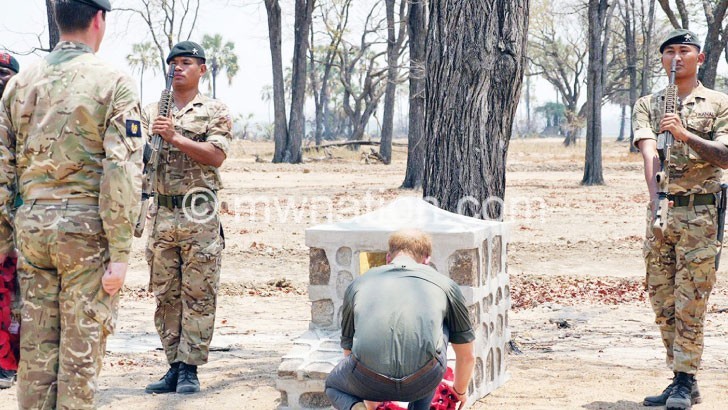‘You’ll never be forgotten’
You will never be forgotten! Brigadier Tom Bateman proclaimed this on Monday as he ushered Prince Harry to lay a wreath for guardsman Matthew Talbot, who was crushed by elephants in Liwonde National Park.
In the scorching sunshine of the lowlands along the Shire River, the Duke of Sussex rubbed his eye as he paced towards the freshly installed memorial stone along a dusty road splitting woodlands ripped by elephants.
Talbot was on a daytime patrol on the country’s largest river when the giant mammals attacked him.

This was the first operational tour for the junior guardsman who performed ceremonial duties for seven years.
His parents’ message that decorates the memorial stone shows the 22-year-old died fulfilling his childhood dreams—“helping to protect God’s creatures whilst also serving your country”.
“We think of you every day, sometimes with a tear but always with a smile. We are all so very proud of your achievements, you will be remembered for the honourable work you were doing in Malawi,” reads the note Michelle and Steve dispatched when they heard of Prince Harry’s planned tribute.
The battle continues
The memorial sits in a windswept spot in the interiors of the stunning mopane forests where British military and Malawian game rangers are sharing jungle tactics in a war on wildlife crimes.
“Anyone who puts themselves in harm’s way while serving their country should be hugely appreciated,” says the British royal.
A mix of tropical woodlands, grasslands and swamps in Liwonde National Park play home to a fantastic diversity of animals, including elephants long hunted for their meat and tusks. In their talk, both local and British squads remember Talbot as a jovial and dedicated soldier killed by animals he loved to protect with a sense of adventure.
Says Captain Angus Aitkin: “Guardsman Talbot paid the ultimate sacrifice that every British soldier is willing to pay. His death is a reminder that our operation is dangerous. Apart from encounters with poachers, we also have confrontation with wild animals we protect.
He says it is “a real privilege and opportunity” to learn from the Malawian rangers and share their anti-poaching skills.
“This park is headed in the right direction considering the good work African Parks is doing,” says the captain, who leads 35 British soldiers.
Tree of hope
Aitkin’s team has trained over 200 local game rangers how to stop wildlife crimes.
In random interviews, the locals commended the British military for sharpening the use of technology to combat poaching which almost halved the country’s elephant’s population in a decade.
During the royal visit, the multicultural team showed Prince Harry how they are working together to save the animals that beckon tourists.
Talbot’s team is credited with clearing nearly 230 snares, muzzleloaders and pangas poachers use to take down game and chop off ivory for sale.
Some of the pangas, snares and hoes confiscated by the counter-poaching squad have been used to fashion a tree of hope where Prince Harry dedicated Liwonde National Park and Mangochi Forest Reserve to Queen’s Commonwealth Canopy. The initiative founded by his grandmother Queen Elizabeth II, requires all 53 countries to share expertise and resources to conserve indigenous forests.
As the wildlife protectors comb the national park with a helicopter humming in the air, African Parks country director Craig Reid is happy that poaching is on the wane.
The illegal activity was widespread when the South African conservation organisation took over the running of Liwonde, Majete and Nkhotakota wildlife reserves from givernment.
He explains: “There were severe law enforcement gaps, with endemic poaching elephants and rhinos. To restore the numbers and balance, we have overhauled protection systems and invested in technology.
“We have fenced about 180 kilometres and reduced population of elephants to reduce human-animal conflicts. We are also working with communities surrounding the protected area to understand why we do what we do.”
Minister of Natural Resources, Energy and Mining Bintony Kutsairacommends the efforts to raise tourism and wildlife conservation in Malawi.
He salutes the British soldiers for “training our wildlife rangers how to protect our wildlife”.
“Malawi highly appreciates the sacrifices demonstrated by the fallen guardsman. We believe he didn’t die in vain,” Kutsaira told Prince Harry.
Another milestone
To director of parks and wildlife Bright Kumchedwa, the Duke’s third coming—like Talbot’s death—personifies Britain’s commitment to safeguarding wildlife in the jungles of Malawi.
“The coming of the Duke of Sussex is another milestone,” says the award-winning conservationist, unknotting the designation of Liwonde and Mangochi Forest as Queen’s Commonwealth Canopy sites. “This raises their profile and provides a platform for networking and exchange of good practices, so it increases the chances for more investment in long-term efforts to promote conservation of wildlife.”
The benefits of conservation are clear in the numbers of tourists trekking to the national park Prince Harry has visited three times.
According to director of tourism Isaac Katopola, the numbers have doubled since African Parks started investing in Malawi.
“Every time the Duke of Sussex comes, it is a big endorsement and the stories of his visit go far,” he says.
“The figures show we are on course to improve tourism. The number of tourists per year has risen from 10 000 to more than 20 000 per year.”





